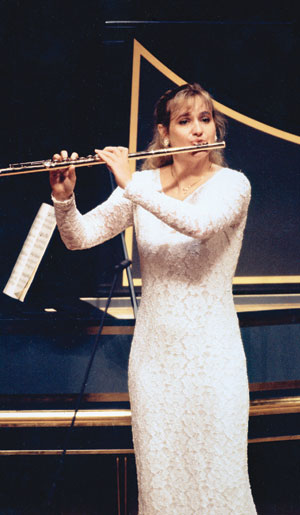
Many flutists enter competitions each year, hoping to gain experience, win prizes, and build resumes. Working diligently in preparation for a competition can help musicians achieve a higher level of playing. Learning the music is only one aspect of preparing for a successful competition performance. Here are ten tips to help boost success in competitions.
1 Recordings: Recording technology has become more commonplace, but when recording with your own equipment, make sure the quality is good. Recordings done in bedrooms often sound too dry. Experiment with the microphone placement and different locations. After creating your C.D., play it on several different players to be sure it will play properly.
2 Read Carefully: Check the rules and guidelines for the competition very carefully. Be sure that you record the correct piece for the recorded round. If you are required to list final-round repertoire on the application form, do so with accuracy. If you fail to list pieces, you may be prevented from performing them. Similarly, if you list a piece you think you might be ready to perform, you may be prohibited from changing the piece. Read all of the rules carefully and observe all deadlines.
3 Time Carefully: Rehearse the program for the live rounds carefully, paying close attention to the timing of each selection. You do not want to run out of time before you get to play the finale. Being stopped by the timer because your program ran beyond the alotted time could be perceived by the judges as a lack of preparation.
4 Consider Memory: When the decision between you and another contestant is close, it is possible that an excellent memorized performance could have put you ahead of the other player. If you decide to perform from memory however, be sure to practice in front of audiences many times to be sure your performance will be solid.
5 Stage Presence: The importance of excellent stage presence should not be taken for granted. Even if the only people in the audience are your parents and the judges, treat the stage as if you were performing for a full hall. Presentation matters. Walk on stage with confidence, bow, tune, and perform. Dress appropriately for the performance. While an evening gown is probably overkill, khakis and a sweater may be too casual. Many times, I have heard judges comment that one finalist or another had exceptional stage presence; it does make a difference.
6 Show Versatility: When you have the opportunity to select works for your program, choose pieces with differing styles. Change your playing to match the various time periods. I have heard judges comment on how nice it was to hear a change in style from a Baroque sonata to a Romantic piece, for example. Study the performance practices of each time period represented in your program and perform the pieces convincingly.
7 Consider the Accompaniment: When using a competition-provided accompanist, there will probably be only a brief rehearsal prior to the performance. Select repertoire with that in mind. For example, Messiaen’s Le Merle Noir is a fabulous piece, but it takes significant rehearsal time to achieve a good ensemble between the flute and piano. Choose pieces that will avoid the extra stress of ensemble considerations.
8 Do What You Do Best! When choosing the music for the live rounds, select musical styles that you play best. If Baroque ornamentation, extended techniques, altissimo register, or memorization are your forte, show that in your selections. In most cases, everyone in the competition will be an excellent performer. Showcase what makes you special.
9 Don’t Give Up Hope: If you are not selected as a finalist or fail to win a prize, do not give up hope. I have observed an ebb and flow in competition applicants. Different people enter each year. If you are not selected one year, keep practicing and try again the next year.
10 Go for it! As one of my former flute teachers always says to me before a performance, “Don’t forget to take musical risks!” Play with passion. You must show musicality beyond simply obeying the printed music. Once in a competition, I heard someone try for an extremely high note toward the end of a piece. While he missed the note, his attempt was done with such energy that he still won first place in the competition. As another former teacher said, “The wrong note with the right feel is better than the right note with the wrong feel.”
Good luck in your competition preparations. Most have age limits, with few open to flutists past age 30, so enjoy the opportunities while you can. When competing, be sure to keep a good perspective. Even though winning is nice, the important thing is to learn from the competition and grow as a flutist.






